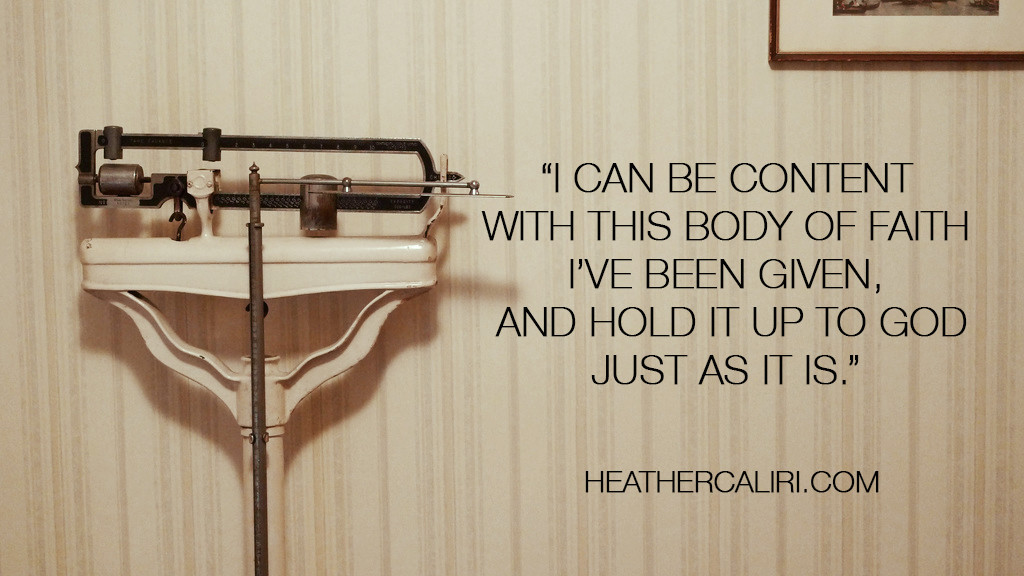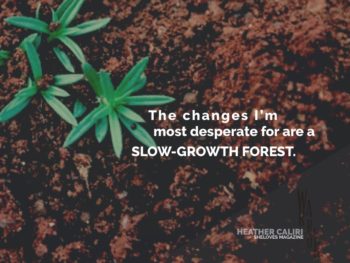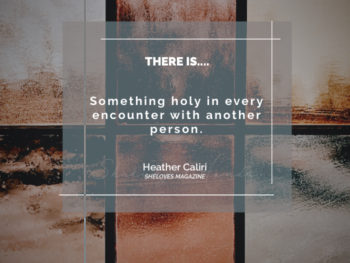My friend and I were talking about theology the other day. She comes from a more conservative background than I do, and told me that she has been thinking a lot about some of her beliefs—core beliefs of her upbringing—and wondering if she really, truly believes them.
Prone to wander, my friend said of her penchant for questions, and I identify completely. We are both prone to wander, and to doubt. I have always thought of myself as the dumb sheep that keeps getting lost when there’s a perfectly good pen nearby.
Talking to my friend, I realized something about my old approach to theology. I thought of it like many of us approach food, exercise and diet.
Trying to Lose My Unfaithfulness
I thought beliefs were kind of like a number on a scale, and theology was like a diet that would get me to the right number. I felt like I should get my beliefs to measure up—and feel bad that I never achieved my target. I put a lot of energy into reading and studying, and praying, trying to shave off that extra doubt that was weighing me down.
I’d inch closer—a new quiet time, a new spiritual discipline, joining a small group, and hope that this time, I’d be able to sustain the practices. This time, perhaps, the doubts and niggling questions wouldn’t derail my discipline.
But after a while—days, weeks, months—I’d lose control. I’d lose interest in the discipline, or read an article critiquing Christianity that made my heart squeeze shut, or go to a Bible study that made me angry or anxious.
And I’d be back to where I started, glancing sidelong at those beliefs I wished I could profess, knowing I’d never, ever be good enough to stand firm in them.
A few years ago, after too many times riding that particular yo-yo, I realized I was never, ever going to reach that target faith.
It just wasn’t happening.
I was never ever going to be the kind of Christian I’d imagined myself being back in college. Or, perhaps, the one I thought my friends or family expected me to be.
I had a really stark choice. Would I chuck my faith altogether because it didn’t measure up?
Or would I accept the beliefs I could actually believe?
I could be content with this body of faith I’d been given, and hold it up, shaky and vulnerable to God, just as it was. I could stop trying to be like the people I’d admired in college, or like my friends, and I could just be, jiggly beliefs and primitive spiritual disciplines and very unsystematic theology and all.
When You Accept Your Faith’s Size and Shape Unconditionally
That was two years ago. I can’t tell you what an astonishing difference it is to be.
Here’s what I realized about all of my work towards achieving some target shape for my beliefs:
It used up a lot of energy that I could have used to enjoy God.
Instead of counting proverbial calories or wincing at my reflection in the mirror, I could rest.
Instead of feeling apologetic about my nascent feminism or keeping mum about my (possibly?) universalist beliefs, or trying to convince people suspicious of my faith that I really truly loved Jesus, I could rest.
I could rest. I could eat. Drink. Enjoy. I could feel my hunger for Jesus and ask Him to satisfy it.
And after I let go of beliefs—lovely, wonderful beliefs that made sense in my head, but not my heart—I realized that the main reason I’d held on to them was this:
I was more afraid of being told I wasn’t a Christian that I was of losing my faith.
I realized that worry was just slightly backward. Was I really going to prioritize fear of what others think over communion with Christ?
I won’t tell you I no longer care what other people think of my faith. No. I care more than I wish I did. But I will tell you that I focus more now on where I am with God. I see every day that He is transforming me in crazy ways, and because of that I worry less.
Feasting on Faith
Look: theology can be lovely and life-giving. It can be like the best kind of food traditions or nutritional guidelines, that show us how to eat well, fellowship with others, care for our bodies, and be wise.
But at this point in my life, for a time, I’m ready to forget about guidelines for a while and just eat.
I’m ready to bow down before Christ and trust that even if I feel like I’ve wandered, He is never never leaving my side.
Image credit: Johnny Vulkan (and my modifications)















 Grieving the Bible
Grieving the Bible
I totally understand what you’re saying. I grew up in a very conservative baptist environment – a sect of baptists who consider Southern Baptists too liberal (though not as fundamentalist as Independent Baptists). I’ve found myself over the last couple of years reevaluating what I doctrinally believe. Do I believe _____ because I really believe it or because I was taught to believe it? And from that I’ve been able to come to peace with not having a firm answer one way or another. I’ve learned to just trust that Jesus loves me not because I’ve got it all together, but because he loves me. And that’s enough. Most of the time. 😉
Heather, this is exactly what I did in adolescence and college, and only now am I starting to just accept my faith for what it is. Thank you for this analogy, it’s going to help me a lot.
What is it about college that does this to us? I guess immaturity leads to black and white thinking. I’m so glad the analogy speaks to you!